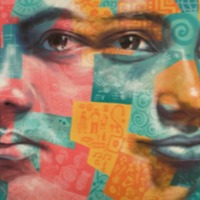
My mum used to have a tortilla shop, but when she got arthritis I quit school and became a cook at a small restaurant in San Pedro Sula to support my family. I was 15.
I worked 12-hour shifts and finished every day at 6pm, the same time that the gang curfew in our city came into effect. There are two main gangs in the area, and anyone on the streets after the curfew becomes a target. Every day I thought might be my last. One evening, my co-worker and I were walking to the bus stop when three gang members stopped and said we’d have to sell sex and drugs for them. “We’re not asking you,” they said. “We’re giving you an order.” They let us go, but I was terrified. The next night after work, they were there, waiting for us. “Time’s up,” they said, and they forced us into a car at gunpoint.
We drove to a poor neighbourhood and stopped at a wooden house with a tin roof. There was a room that had a hole in the floor, and they pushed us into it and locked us in. When they finally opened the door again, a policeman was standing over us. We thought we were saved. Then he turned to the gang members and said: “It’s good you finally got some new girls. Let me try them first.” He was the first person to rape us. Then the gang members raped us.
In the morning, men paid to have sex with us; and every night the gang would tie us up, cover our eyes and separate us. Then we’d be driven to different street corners to sell cocaine, and one of the guys would stand behind us with a gun, collecting the cash. They gave us no food, no water. They said we didn’t deserve it, that we had no rights. When I begged for a sip of water, one of them told me to drink my own urine.
Eventually, a client helped me escape. I told him I was very weak and was being held there against my will. He came back the following evening, put me in a taxi to the bus station, and paid for my ticket to the Mexican border. Now I’m applying for refugee status to stay here in Mexico.
Interview and photograph by Encarni Pindado for the Guardian









